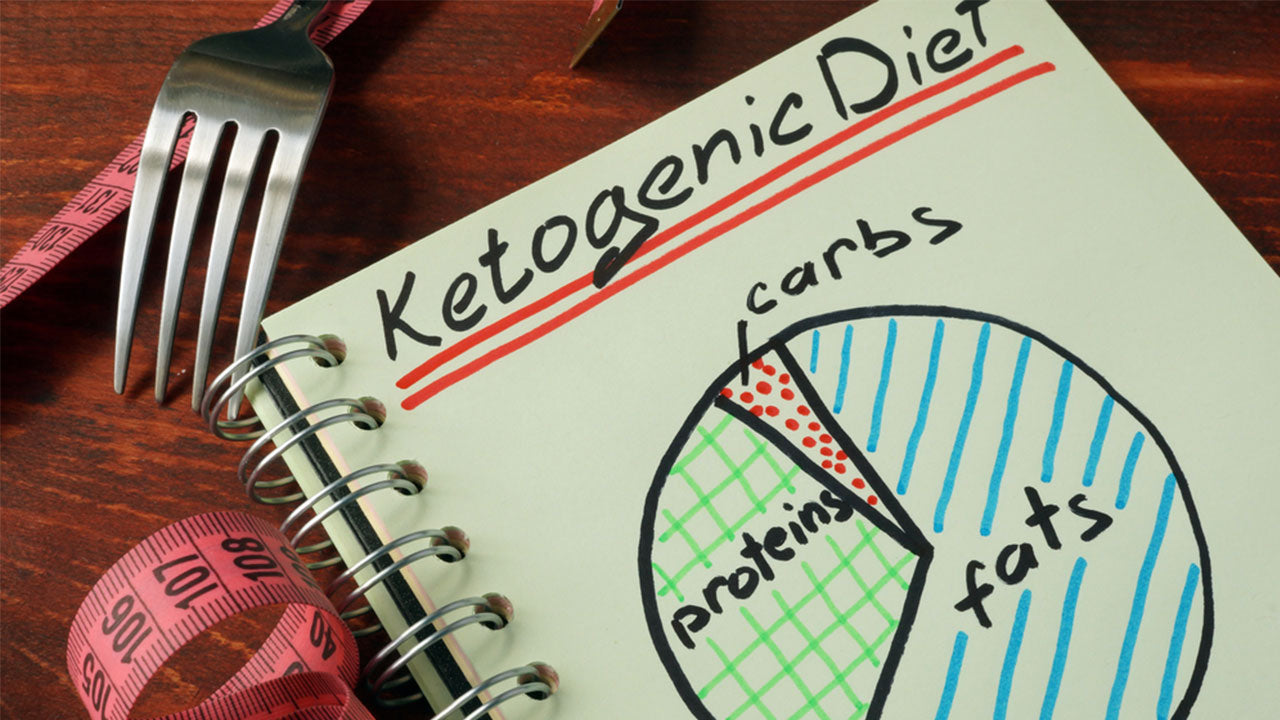What Is the Keto Diet—and Can Amino Acids and Other Supplements Really Improve Results?
 By: by Amino Science
By: by Amino Science

People diet for different reasons, such as preventing or treating infection, managing diabetes, gaining muscle mass, or maintaining a healthy weight. Weight loss is the most popular reason for dieting, but weight loss can be quite difficult to achieve depending on the type of diet you follow. If you're interested in how the foods you eat can impact your weight and well-being, chances are, you've encountered the phrase "keto diet," but you may still be wondering: "What is the keto diet?"
The ketogenic diet, often shortened to the keto diet, is an extremely low-carbohydrate diet approach (even sticter than the infamous Atkins diet) that proponents state can train your body to burn fat more efficiently. Many individuals have shared their experiences using the keto diet to lose weight, improve their overall health, and enhance physical and mental performance, leading to increased interest in the diet. Some of the benefits of the keto diet have been validated by scientific studies and a growing number of medical professionals recommend it as a means of addressing lifestyle-related chronic conditions.
As more and more people adopt a keto diet, often with the goal of losing weight and keeping it off, some have begun exploring whether certain supplements can improve their results. It appears that amino acids show particular promise as a means of enhancing metabolic processes responsible for ketogenic weight loss.
In this article, we'll provide an introduction to the keto diet, cover some of the most common benefits associated with the keto diet, and then share the best keto diet supplements to take and how those supplements can help accelerate your keto diet results.
What Is the Keto Diet?
The ketogenic diet was developed in the 1920s as a treatment for epilepsy. Traditionally, it was used to treat children, but in recent years, it has been used to treat adults with epilepsy that does not respond to other interventions. And, of course, its use has expanded far beyond that initial medical context.
After the fat-free diet craze went bust, researchers turned their attention to carbohydrates. Ironically, diets that discourage fatty foods often encourage the consumption of low-fat, fat-free, or trans-fat options loaded with highly processed ingredients that the body stores as fat. Low-fat diets tend to place less emphasis on monitoring the intake of carbohydrates, which can greatly jeopardize calorie-burning processes at the cellular level.
Carbohydrates come in many food forms; sugars, complex carbohydrates (starches), and fiber are the three main types. Regularly consuming carbohydrates over time has been linked to higher risk of developing chronic illness, especially cardiovascular disease.
How the Keto Diet Encourages Your Body to Burn More Fat
The foundational principle of the keto diet is rigid carbohydrate restriction. Carbohydrates are the body's preferred source of fuels; however, your body can also run off of fat. When you keep your carb intake below a certain threshold while adhering to a high-fat diet, your body switches from burning carbs for fuel to burning fat.
The "keto" in ketogenic refers to small fuel molecules called ketones that your body runs off of when it does not have access to significant quantities of glucose (blood sugar) from carbohydrates.
When you eat carbohydrates, your body quickly converts them into glucose via a process called glucogenesis. Excess protein can also be converted to glucose. The glucose produced from carbohydrates and protein can be used to power your body, but any that's not immediately needed gets stored as fat.
If your body does not have a ready supply of glucose, it switches over to a process called ketogenesis. The liver converts loose fatty acids into ketone bodies that cells use for energy while the body metabolizes fat and burns calories at a high rate. Ketosis, a term that pops up frequently in reference to the keto diet, describes the moment when the body enters the metabolic state in which it's running off of fat rather than carbohydrates.
The quickest way to enter a state of ketosis is to fast, but that short-term approach has its limitations. Adopting the keto diet allows you to enter and stay in ketosis for a sustained period of time.

The Basics of the Keto Diet
Entering a state of ketosis does require some number crunching to track nutrient intake, something many other diets involve too. The basic ratios of the keto diet are:
- 70% to 75% fat
- 15% to 25% protein
- 5% carbohydrates
The most crucial aspect of these ratios is carbohydrate intake. Most individuals will need to limit their carb intake to 50 grams or fewer of net carbs per day. Some experience even greater benefits with a daily carb intake below 20 grams.
For the best keto diet results, you will also need to pay attention to how much protein you consume. The bulk of your calories should come from high-fat, moderate-protein foods, since excess quantities of protein can be converted into glucose.
Athletes or individuals who engage in high-intensity activity should monitor their performance when on the keto diet and may require more protein and carbohydrates for peak metabolic function. One to two days of carbohydrate refueling followed by ketogenic dieting the remaining days of the week is a common dietary program for high-endurance performers.
But if you decrease the intensity of your workouts, plan accordingly. A more precision-based model for carbohydrate intake may work best in this instance. Eating easily digestible natural carbohydrates, like honey, 30 minutes prior to a moderate to vigorous workout can offset potential energy deficiencies created by a keto diet meal plan.
7 Health Benefits of the Keto Diet
The time that it takes for you to achieve ketosis depends on how well-adapted your body is to the ketogenic process. The most reliable way to determine whether you have entered a state of ketosis is to use a blood ketone meter, which can gauge ketone levels in your blood.
Optimal ketosis—the point at which you begin to experience the health benefits of the keto diet, such as weight loss—typically begins when blood ketone levels reach between 1.5 mmol/L and 3.0 mmol/L.
For most people, it takes 2 to 3 weeks to reach optimal ketosis. During this time, you may experience symptoms of “keto flu" as your body acclimates to this new metabolic state. Some common side effects people experience during this entry phase include:
- Mood swings
- Drowsiness
- Fatigue
- Intestinal discomfort
Once you reach ketosis, however, any initial unpleasantness you experienced will clear up and you will begin to reap the health benefits. Here are seven of the most common benefits associated with the keto diet.
1. Sustainable Weight Loss
The keto diet, in essence, turns your body into a fat-burning machine. As you might anticipate, this can have significant benefits when it comes to weight loss. Strong scientific evidence shows that the keto diet dramatically increases the body's fat-burning capacity while decreasing levels of insulin, a hormone that encourages fat storage.
2. Decreased Hunger
Researchers have also found that the keto diet supports body fat loss while decreasing appetite, making it easier to stick to the meal plans you set up for yourself.
One reason for this is likely that when your body uses fat as its primary fuel source, it has round-the-clock access to weeks or months of stored energy. This eliminates the hunger attacks many experience when their blood sugar spikes and then plummets after a high-carb meal.
3. Balanced Blood Sugar Levels
Adopting a keto diet can help you gain control over your blood sugar levels. For this reason, medical practitioners may recommend the keto diet to patients with type 2 diabetes. The keto diet can not only lead to better management of this condition, but also, as studies have shown, to a reversal of the disease.
Though no randomized, controlled trials have examined whether the keto diet can help prevent or reverse pre-diabetes, its impressive effect as a treatment for full-blown type 2 diabetes along with anecdotal evidence makes a strong case for its likely success.
4. Reduced Risk of Heart Disease
Multiple studies have shown that adopting a low-carb diet, like the keto diet, can positively influence several key risk factors for the development of heart disease, including cholesterol levels. Levels of high-density lipoprotein (HDL) cholesterol and triglycerides consistently drop while low-density lipoprotein (LDL) levels remain fairly stable.
It's also common for people who switch from, for instance, the standard American diet (aptly abbreviated to SAD), to the keto diet to see decreases in blood pressure numbers.
5. Heightened Cognitive Skills and Mental Clarity
While weight loss and improved physical health rank high among the reasons people try the keto diet, some seek it out for its beneficial impact on cognition.
When the body enters ketosis, your brain activity no longer depends on glucose stores. Instead, it runs off a steady supply of ketones. This can eliminate frustrating issues related to blood sugar swings, such as brain fog and difficulty focusing.
6. Boosted Energy and Endurance
By allowing you to access the vast amounts of energy in your body's fat stores, the keto diet can keep your vitality high.
While stores of glucose only contain enough energy to fuel you through a few hours of physical exertion, your fat stores could theoretically last for weeks.
7. Better Digestion and Nutrient Absorption
Many find that adopting the keto diet can relieve symptoms of digestive distress associated with IBS and other conditions.
This benefit often sets in rapidly. Within days of following a keto meal plan, individuals report improvements and fewer instances of bloating, gas, and stomach cramps and pain. 
It generally takes 3 to 6 months to train your body to reach optimal ketosis at a fast rate.
Once you reach that milestone, you can begin to gradually re-introduce plant-based carbohydrates from fruits and vegetables into your diet. At this stage, it's particularly important to continue to monitor your protein intake. Protein surges can cause insulin levels to rise in the blood, which can hinder ketosis.
While transitioning into ketosis, it can be beneficial to engage in high-intensity workouts, as doing so will accelerate glycogen depletion. Many find that when they are in a state of ketosis, they feel best when participating in low-impact exercise, such as jogging or speed walking, yoga, swimming, or dancing.
Using Supplements to Improve Your Keto Results
Those who commit to a keto-friendly, low-carb foods centered approach to eating long term often find that adding specific supplements can maximize the benefits of the keto diet while minimizing any less-than-pleasant side effects.
Some supplements help fill in possible deficiencies that can result when personal preferences are overlaid on top of the restrictions built into the keto diet. Others help counteract symptoms of keto flu experienced while the body adapts to a state of ketosis, or enhance athletic performance.
Here are three supplements that can enhance the positive effects linked to the keto diet and offset any unwanted ones.
1. Amino Acids
Amino acids are the building blocks of proteins. Proteins consist of single- or long-chain amino acids and are necessary nutrients for most cell and organ functions. Consuming measured proteins in correct proportion to nutrient fat can facilitate ketosis. Ketogenic amino acids can convert to acetyl-CoA, a precursor of ketone bodies, whereas glucogenic amino acids degrade to glucose.
Lysine and leucine function exclusively as ketogenic amino acids. Isoleucine, phenylalanine, threonine, tryptophan, and tyrosine function both as ketogenic and glucogenic amino acids.
Lysine, leucine, phenylalanine, and tryptophan are all considered essential amino acids—meaning the body cannot synthesize them on its own and they must be acquired through food or supplements. Leucine, for example, can be found in abundant quantities in cheese, soybeans, chicken, nuts, seeds, and seafood.
The branched-chain amino acids (BCAAs)—leucine, isoleucine, and valine—have particular relevance for keto dieters engaged in physical training, as they can help reduce exercise-related muscle damage, muscle soreness, and fatigue during exercise. However, many studies show that the most benefit can be derived from a well-formulated essential amino acid supplement rather than individual amino acid supplements.
For more information on the best amino acids to take to complement a keto diet, check out this article.
2. Beta-Hydroxybutyrate (BHB)
Beta-hydroxybutyrate (BHB) supplements, sometimes referred to as exogenous ketones, may be able to elevate ketone levels, among other desirable benefits.
As we've discussed, your body naturally produces ketone bodies through a process called ketogenesis. Some experts believe that exogenous ketones from an external source can increase your blood ketone levels, helping you reach a state of ketosis more quickly.
There's also some evidence to show that BHB supplements can counteract the fatigue and mood swings that some experience when they start the keto diet. Once you've entered ketosis, studies show that these same supplements may help to enhance athletic performance, decrease recovery time between training sessions, and lower appetite levels.
Some general guidelines for a starting dosage for BHB supplements would be to take either 2 BHB oil capsules daily or 1 scoop of BHB oil powder on an empty stomach between meals with 16 ounces of water. You should limit yourself to three such doses per day.
Some individuals experience stomachaches when taking BHB supplements. If you experience digestive upset, try lowering your intake, then gradually increase to the ideal dose.
3. Medium-Chain Triglycerides (MCTs)
Medium-chain triglycerides (MCTs) can be an ideal tool for keto dieting. These fatty acids are used to form ketones in the liver, and supplementing with MCT oil can help you feel more satiated during the ketosis transition.
Keto-friendly coconut oil is a rich natural source of medium-chain triglycerides, although it provides a far less concentrated dose of MCTs than expressly manufactured MCT oils.
MCTs and amino acids work together synergistically. The presence of amino acids in the body supports the essential metabolic process by which the fatty acids are transformed into ketones, and a study published in the journal Comparative Biochemistry and Physiology determined that dietary fat, especially medium-chain fats, helps to regulate amino acid transport.
As researchers study these unique compounds found in healthy dietary fats, they continue to add to the long list of health benefits associated with an increased intake of MCTs, including:
- Increased fat burning during athletic activity
- Bolstered growth of good gut flora
- Lowered cardiovascular risks
- Protection against neurodegenerative disorders such as Alzheimer's disease
- Increased antibacterial, antiviral, and anti-fungal activity
As with BHB supplements, MCT oil supplements, such as these softgels, should be taken with water—in this case, at least an 8-ounce glass. Only one daily dose is needed.


Up to 25% off Amino
Shop NowTAGS: diet programs
Join the Community
Comments (0)
Most Craveable Recipes




 833-264-6620
833-264-6620



















